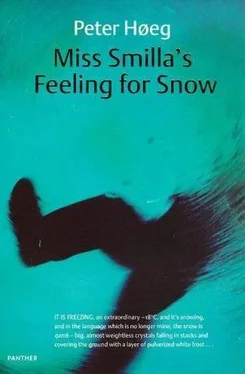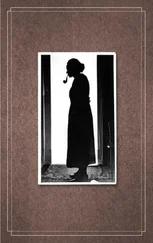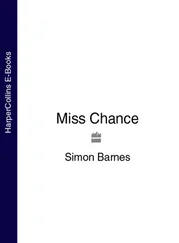Peter Høeg - Smilla's Sense of Snow aka Miss Smilla's Feeling for Snow
Здесь есть возможность читать онлайн «Peter Høeg - Smilla's Sense of Snow aka Miss Smilla's Feeling for Snow» весь текст электронной книги совершенно бесплатно (целиком полную версию без сокращений). В некоторых случаях можно слушать аудио, скачать через торрент в формате fb2 и присутствует краткое содержание. Жанр: Современная проза, на английском языке. Описание произведения, (предисловие) а так же отзывы посетителей доступны на портале библиотеки ЛибКат.
- Название:Smilla's Sense of Snow aka Miss Smilla's Feeling for Snow
- Автор:
- Жанр:
- Год:неизвестен
- ISBN:нет данных
- Рейтинг книги:3 / 5. Голосов: 1
-
Избранное:Добавить в избранное
- Отзывы:
-
Ваша оценка:
- 60
- 1
- 2
- 3
- 4
- 5
Smilla's Sense of Snow aka Miss Smilla's Feeling for Snow: краткое содержание, описание и аннотация
Предлагаем к чтению аннотацию, описание, краткое содержание или предисловие (зависит от того, что написал сам автор книги «Smilla's Sense of Snow aka Miss Smilla's Feeling for Snow»). Если вы не нашли необходимую информацию о книге — напишите в комментариях, мы постараемся отыскать её.
Smilla's Sense of Snow aka Miss Smilla's Feeling for Snow — читать онлайн бесплатно полную книгу (весь текст) целиком
Ниже представлен текст книги, разбитый по страницам. Система сохранения места последней прочитанной страницы, позволяет с удобством читать онлайн бесплатно книгу «Smilla's Sense of Snow aka Miss Smilla's Feeling for Snow», без необходимости каждый раз заново искать на чём Вы остановились. Поставьте закладку, и сможете в любой момент перейти на страницу, на которой закончили чтение.
Интервал:
Закладка:
He has a square, flat, matte-black cassette tape recorder on the table in front of him. He puts in the tape. The sound comes from distant speakers on the perimeter of the room. Now that my eyes are becoming adjusted to the darkness, I can sense the way the walls curve along with the sides of the ship.
He listens for half a minute with his head in his hands. Then he stops the tape.
"Mid-forties. Grew up near Angmagsalik. Very little formal education. On top of the East Greenlandic there are traces of more northern dialects. But up there they move around too much to say which exactly. He has probably never been away from Greenland for any appreciable length of time."
He looks at me with light-gray, almost milky eyes, with an expression as if he's waiting for something. Suddenly I know what it is. It's the applause after the first act. "Impressive," I say. "Can you tell me more?"
"He's describing a journey. Across ice. With sleds. He's probably a hunter, because he uses a series of technical terms, such as anut for the dog harnesses. He's probably talking to a European. He uses English names for locations. And he seems to think he has to repeat many things."
He listened to the tape for a very short time. I wonder whether he's pulling my leg.
"You don't believe me," he says coldly.
"I just wonder how you can conclude so much from so little."
"Language is a hologram." He says this slowly and firmly.
"In every human utterance lies the sum total of that person's linguistic past. Now, you yourself… You're in your mid-thirties. Grew up in Thule or north of there. One or both parents Inuit. You came to Denmark after assimilating the entire linguistic foundation of Greenlandic, but before you lost the child's instinctive talent for learning a foreign language perfectly. Let's say you were between seven and eleven years old. After that it gets harder. There are traces of several sociolects. Perhaps you lived or went to school in the northern suburbs, Gentofte or Charlottenlund. There is also a trace of a North Sealand accent. And strangely enough, even a later hint of West Greenlandic."
I make no attempt to hide my astonishment. "That's true," I say. "It's all basically true." He smacks his lips in satisfaction.
"Is there any possibility of determining where the conversation took place?"
"You really can't tell?"
I notice it again. His bold self-confidence and his sense of triumph at his knowledge.
He rewinds. He doesn't look at the tape recorder while he's handling it. He plays about ten seconds for me. "What do you hear?"
I hear only the incomprehensible voice. "Behind the voice. Another sound."
He plays it again. Then I hear it. The faint, escalating sound of a motor, like a generator starting up and then shut off.
"A prop plane," he says. "A big prop plane."
He fast-forwards. Turns it on again. A segment with the faint clatter of dishes.
"A large room. Low-ceilinged. Tables being set. Some kind of restaurant."
I can see that he knows the answer. But he's enjoying pulling it very slowly out of his top hat.
"A voice in the background."
He plays the same segment several times. Now I can just make it out.
"A woman," I say.
"A man talking like a woman. He's yelling. In Danish and American English. Danish is his mother tongue. Presumably he's yelling at the person setting the table. He's probably the restaurant manager."
One last time I wonder whether he's just guessing. But I know he's right. He must have an abnormally precise and skilled sense of hearing and a gift for languages.
The tape is playing again. "Another prop plane," I suggest.
He shakes his head. "A jet. A smaller jet. Quite soon after the previous plane. An airport with heavy traffic." He leans back.
"Where in the world can an East Greenlandic hunter sit and talk in a restaurant where the tables are being set, where a Dane is yelling in American English, and where you can hear an airport in the background?"
Now I know, too, but I let him tell me. Let little kids have their fun. Even grown-up kids.
"Only one place. At Thule Air Base."
On the base the club is called the Northern Star. A restaurant in two sections, with a dance hall.
He starts the tape again. "It's strange." I don't say a word.
"The music… behind the voice… remnants from the previous recording. It's pop, of course. 'There Must Be an Angel' by the Eurythmics. But the trumpet…"
He looks up.
"Of course you can hear that the piano is a Yamaha grand."
I can't hear any piano at all.
"A loud, heavy, flashy tone. A rather clumsy bass. Often a little off-key. Certainly no Bosendorfer… But it's the trumpet that surprises me."
"There's some of the music left at the end of the tape," I say.
He fast-forwards. When he presses the play button, we're at a spot right after the music starts.
"Mr. PC!" he says. Then his face goes blank, self-absorbed.
He lets it play to the end. When he stops the tape, he seems very far away. I give him time to come back. He wipes his eyes.
"Jazz," he says quietly. "My passion…"
It was a brief moment of letting down his guard. When he comes back, he's as cocky as ever. Three-quarters of the politicians and bureaucrats who are part of the Home Rule belong to his generation. They were the first Greenlanders to get a university education. Some of them have survived and held on to their identities. Others-like the curator-with their fragile but abnormally overblown self-confidence, have become genuine, intellectual Northern Danes.
"It's actually quite difficult to recognize a musician from the tone. Who can you identify this way? Stan Getz when he plays Latin-American style. Miles Davis from his naked, precise, vibrato-less sound. Armstrong by his meticulous crystallization of New Orleans jazz. And this musician."
He looks at me, full of anticipation and reproach. "Great jazz is synonymous with the John Coltrane quartet. McCoy Tyner on the piano, Jimmy Garrison on bass, Elvin Jones on drums. And in the periods when Jones was in prison: Roy Hanes. Just those four. Except on four occasions. The four concerts at the New York Independent Club. That's when Roy Louber joined them on trumpet. He learned his sense for European harmonizing and his incantatory African nerve from Coltrane himself."
We sit there for a moment thinking about this. "Alcohol," he says suddenly, "has never been good for music. Cannabis is supposed to be great. But alcohol is a ticking bomb under jazz."
We sit there listening to the bomb ticking.
"Since that time in '64, Louber has been working on drinking himself to death. On his way down, in both human and musical terms, he happened to come through Scandinavia. And he stayed here."
Now I remember his name from concert posters. From certain scandalous newspaper headlines. One of them said: FAMOUS DRUNK JAZZ MUSICIAN TRIES TO TIP OVER CITY BUS. "He must have been playing in the restaurant. It's the same acoustics. The people eating in the background. Someone has seized the opportunity to make a pirate recording."
He smiles, full of sympathy for such a project. "They've managed to get themselves a free live recording. You can save a lot of money with a little Walkman. If you dare take the risk."
"Why would he go to Thule?"
"Money, of course. Jazz musicians live on so-called bare-ass jobs. Imagine what it costs…"
"What costs?"
"To drink yourself to death. Have you ever thought about how much money you save by not being an alcoholic?"
"No," I say.
"Five thousand kroner," he says.
"Excuse me?"
"That will be five thousand kroner for the session. Ten thousand if you want a notarized transcription of the contents."
There's not a trace of a smile on his face. He's dead serious.
Читать дальшеИнтервал:
Закладка:
Похожие книги на «Smilla's Sense of Snow aka Miss Smilla's Feeling for Snow»
Представляем Вашему вниманию похожие книги на «Smilla's Sense of Snow aka Miss Smilla's Feeling for Snow» списком для выбора. Мы отобрали схожую по названию и смыслу литературу в надежде предоставить читателям больше вариантов отыскать новые, интересные, ещё непрочитанные произведения.
Обсуждение, отзывы о книге «Smilla's Sense of Snow aka Miss Smilla's Feeling for Snow» и просто собственные мнения читателей. Оставьте ваши комментарии, напишите, что Вы думаете о произведении, его смысле или главных героях. Укажите что конкретно понравилось, а что нет, и почему Вы так считаете.




![Рута Шепетис - Ashes in the Snow [aka Between Shades of Gray]](/books/414915/ruta-shepetis-ashes-in-the-snow-aka-between-shades-thumb.webp)







